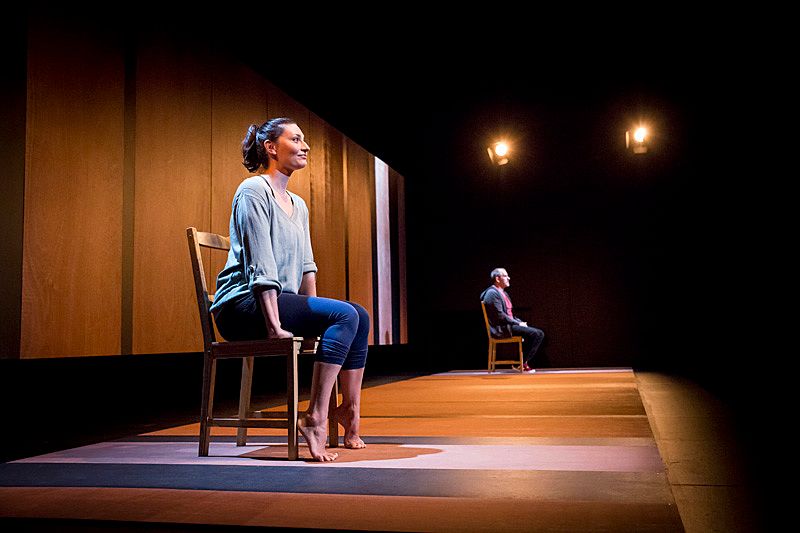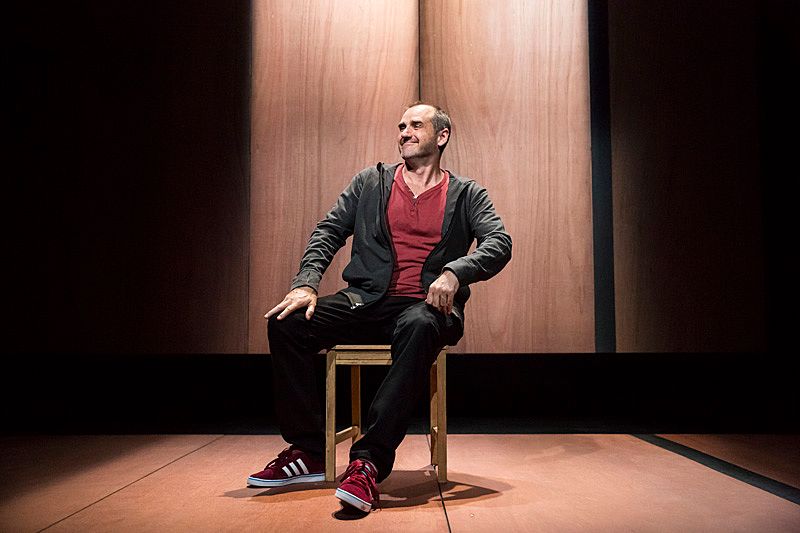Review: Pure and Deep
Alice Harbourne, Rosabel Tan and Eddy Dever discuss Toa Fraser's sequel to Bare, Pure and Deep.
VENUS: Are you concerned about any particular aspect of your health?
DAVE: We are all going to die.
VENUS: Yes we are. But not just yet.
- Bare
In 1998, Toa Fraser premiered Bare. It was the middle of winter, and on a stripped-back stage in the old Silo Theatre, audiences bore witness to two actors - Ian Hughes and Madelaine Sami - performing a series of monologues that plunged us into the lives of the people around us. An anonymous parking warden ("the digestion system of the city"). A young personal trainer named Venus who was about to meet her grandfather for the first time. Dave, a movie-and-Burger-King-loving geek. Endless radio shoutouts. And a young boy who'd seen far more in his short years than anyone should ever have to in a lifetime.
We sweated the small stuff (how many Flybuys points we were earning) and we sweated the big stuff (how many Flybuys points we were earning), but more than that, Bare took a machete to the city and presented us with a cross-section of our neighbours, of strangers, and of the people we see on the street and never think twice about.
Sixteen years on, and Fraser has written its sequel, Pure and Deep. We're older, and so are Venus and Dave. Venus now runs a yoga studio and dreams of living by the beach out west - somewhere where she can listen to herself, and breathe - and Dave's a transmedia producer fluent in digital buzzwords. Whereas Bare was about discovering yourself - who you are and how you relate to the world around you - Pure and Deep is about knowing who you are, and knowing the world you want to live in.
Alice Harbourne
Have you both read Bare?
Eddy Dever
I haven't.
Rosabel Tan
I've read it, and I saw Silo's 10th anniversary performance with Curtis Vowell and Morgana O'Reilly, but I don't think you needed to have. Did you feel like you'd missed something?
Alice
No, though I'd be interested to see how strongly it references the time of the play. In this play it seemed to be rammed down our throats a little.
Rosabel
Bare does have a gentler touch, and some of its monologues aren't anchored to a particular zeitgeist in the same way that certain monologues in Pure and Deep are. That one seemed to be more about connection and how we relate to others, and even though that's still a theme here, it's swallowed by those overarching concerns about technology and the environment and the way that those are presented.
Alice
Yeah, and although this play is set the present day, its overarching themes are still rooted in the past - not even the 90s, but the 70s - in discussions like McLuhan’s The Medium is the Message.
Rosabel
That was a nice callback, the reminder that none of these concerns are new. Technological advance is always going to be seen as changing the way we think and communicate. The environment is constantly being stripped away and destroyed. We will always hold fears around colonisation in its various forms.
VENUS: When did you get so brainy?
DAVE: It’s just YouTube.
- Pure and Deep
Rosabel
I do think the play's a historical one more than anything. Like Bare, it takes the pulse of a city with a loving eye. It's inclusive, and it's critical, though in this instance it felt a little dated. It felt like an Auckland I knew three years ago, and so much has changed since.
Alice
Definitely! It felt very dated - what do you think contributed to that?
Rosabel
The values and the fear dated it for me. There was a lot of soapboxing about the environment, and that rising panic was never counterbalanced by action. There were those two academics theorising about what we’d consider the environment to be today – and whether it’s more digital or physical – but for it to have been a play set in today's Auckland it would’ve needed someone doing something to address those fears: A Gen-Zero-Lucy-Lawless-style character.
Alice
Totally. I also found some of the acting tropes a little old - Mia Blake's Russian, the 'noble savage' hippy who just wanted to have sex in the sea...
Eddy
Definitely agree with that.
Rosabel
Yeah there were a few characters that only scraped the surface, making them feel cliche. But there were scenes that transcended this and offered this sliding, jolting perspective on how we relate to each other. This happened most poignantly in the scenes with Venus and Dave -
Alice
- and the enforced distance and proximity of the two longest scenes - the pair opposite a table, yet sat as far apart as possible on either side of the stage, or as the only two people at an intimate yoga class.
Eddy
I liked that it wasn't too demonstrative of how their relationship developed. It could’ve easily become a boring long-lost-lovers-reunited story, but Fraser was more subtle than this.
...time passes, and they relate differently.
Rosabel
Yeah that dinner scene was so wonderfully written. When Dave recalls the night they went for dinner the night after they broke up - it felt novel and so on point. It killed me. And the list of positions –
Eddy
I loved the way Ian Hugues played that –
Alice
There were some genuinely funny moments –
Eddy
I really enjoyed the way he played all of it. He commands the stage with such effortlessness.
Alice
Ditto Mia Blake. Especially as Venus the yoga teacher, where her calm composure was undermined by the need to give rapid, breathless instructions to get into poses with unpronounceable names.
Eddy
I found the action of switching from Venus the friend to Venus the yoga teacher really wonderful. It was such a palpable shift.
Rosabel
There was some fantastic writing, and some beautiful and perceptive observations. The perceived ridiculousness of calling sitting the new smoking, or the social etiquette of acknowledging acquaintances at a café, and then you had this taut emotional devastation underying it all, dragging you through. This is a world that’s self-absorbed, that’s losing touch with nature (“the trees are dying of grief”), we’re unhealthy, we’re fat, we want a McDonalds at Piha. We’re killing ourselves, actively and passively. Our darkest moments are no longer shared, but experienced alone.
That monologue about suicide, though. It was spoiled for me by the attempt to tie it to the environment.
Alice
Oh, the bit where she bemoaned NZ for not being 100% pure anymore?
Rosabel
Yeah. What struck me about this show was how lost everybody was, more so than when they were young adults in Bare. There was a lot of complex anger, nobody to blame, and too many fig-leaf targets.
Eddy
That was really illustrative of Venus' argument about the loss of connection. It felt like everyone wanted something, but no one knew exactly what it was; they all felt that answers were attainable, but at the same time elusive. Venus was the only character who didn't have that sense of disconnect to the same extent.
Rosabel
Yeah to that effect I thought the play had an underlying technophobia. Although Dave and Venus were diametric opposites, Venus was far more aggressive in her resistance to technology and her romanticisation of nature, whereas Dave passively accepted technological evolution. It felt like resignation.
Eddy
I don't know about that. I think it presented a vision of technology servicing the spiritual needs of people.
Alice
The debate about whether they should move to London suggested they did. That idea that leaving New Zealand, a beautiful prison, would make everything better is, I think, commonly felt at least once in the life of a New Zealander. The answer is as muddy as the characters are lost - you could leave, and live in London which on a scale of merits determined by Google is classed as a world leading city for culture, nightlife, bars but incredibly low for quality of life, is why I think most New Zealander's choose to stay here. That puts a lot of pressure on defining what 'quality of life' means, and leads to these 'yearnings' for a real experience with nature, which in the end are nearly always simulated - the set was made of wooden planks, not trees, for instance.
For me, Venus (she's called Venus!) epitomised this struggle - her husband was technically lost to the sea - but she believed he was lost to politics.
Rosabel
That final conversation felt important, too, because it posed the question of whether you can reconcile a yearning for nature (Venus) with the desire to embrace technology and progress (Dave).
Alice
And isn't the answer always no?
Rosabel
Is it?
Alice
I don't know, I've got a million different answers.
Rosabel
I mean, for the answer to be yes, we'd be describing a kind of utopia. All progress would require considering commercial and political agendas hand-in-hand with social responsibility.
I think you can find pockets of it in life.
Eddy
I go back to what I was saying before. I think this play presents an alternative vision. I don't think it's a technophobic manifesto, but a warning that we're heading in a bad direction. A suggestion that we should shift direction, not turn back. But, like the characters, there’s a tension between knowing there’s a better place matched with the anxiety of not knowing how to get there or what it looks like.
This all feeds into how I felt leaving the theatre. I didn't come out feeling as provoked as I would have liked. I wanted it to speak more directly to me and the lack of answers made for passive watching.
Alice
I agree, Eddy - even when the direction meant the actors were directly addressing us, attempting to provoke us, there was a sense of 'What are you trying to ask me?'
Rosabel
I don't know if the play was inviting a response. At times it even felt like it was lecturing.
Eddy
But the skill of the actors made them damned good lectures to watch.
On the whole, I would absolutely recommend this show. I think it's a really interesting piece of contemporary New Zealand theatre.
Alice
I really enjoyed it, but I thought it was half an hour too long –
Eddy
Half an hour too long? It was only 85 minutes!
Alice
Was it? Oh dear! I felt at points it could have been snappier. And I think too much of it was used to tell us ‘This is the world you live in now’, to which I felt like saying ‘Yeah, and…?’ – not that it’s not important to think about that, but it wasn’t posing constructive solutions for moving forward.
But the actors were fantastic and I was never once bored.
Rosabel
I’d recommend it too. It’s uniquely ambitious in its attempt to capture the zeitgeist of a city and Ian and Mia are incredible.
I think you're right, Alice, that it felt more like a historical document than one that challenged us, though I think the difficulties we’ve had with its ideologies are precisely what makes it an important play. The way it jars with your individual experience of Auckland makes you consider the directions we are - and aren't - going in.
And in terms of it being a sequel to Bare, I'm hoping for a third. Maybe even a fourth. I'd love to see how these characters evolve over time.
Pure and Deep plays at the Herald Theatre
from 12-23 November
Tickets available through Ticketmaster



